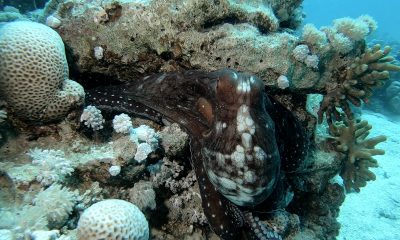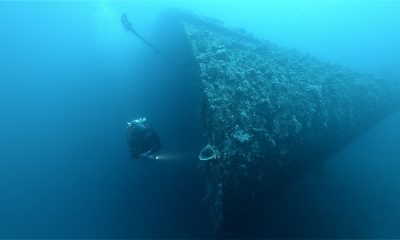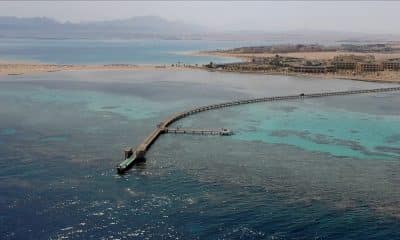Marine Life & Conservation
Underwater Litter Picking In Cornwall
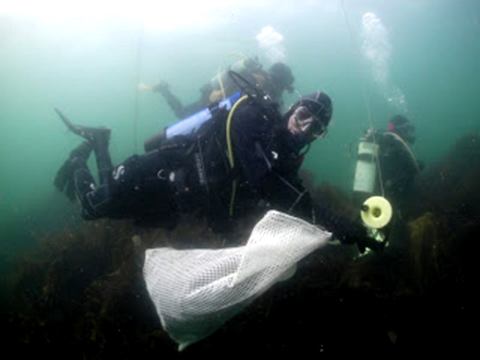
Litter is the outward sign of a lazy individual or community. Discarding litter shows total disregard for other people and the environment. As well as being unsightly it is causing havoc in the marine world. Animals are caught up in it, others feed on it only to die of starvation and poisoning. We have got to the stage where seeing discarded drink cans, plastic and other waste products are part of normal life.
Mark Milburn of Atlantic Divers in Falmouth Cornwall decided to do something about it. Each month Mark heads an underwater litter pick at different locations around the Falmouth area. I asked him how it all got started.
“Early in 2012, a few of my past students had contacted me; they had been struggling to find buddies to dive with. I decided to organise a social dive which I advertised on Facebook. Quite a few locals turned up as well as some of my past students. It was quite effective. I then made the decision to organise these social dives once a month, to give everyone a chance to get to know each other at their leisure.
During an escorted dive in June of 2012, while I was showing someone the delights of some of Falmouth’s shore dives, I noticed quite a bit of litter underwater at Swanpool Beach. I hadn’t realised that there was much before; was this new, or were my eyes now open? I almost felt ashamed, so darted about picking up carrier bags and shoving them in my drysuit pockets. The person I was escorting enjoyed the dive and was impressed with my litter collection. I thought to myself “I need to clean this up”. It would be a huge task but worth it. Later that evening I was wondering where to do the next social dive, Swanpool wasn’t the most exciting of dives, just easy and quite pleasant. Then it clicked, combine the two, a social dive to collect litter.
We set a date for August, a Sunday lunchtime so everyone could have their ‘lie in’. The owner of Swanpool was helpful and organised a press release. We received a call from BBC Radio Cornwall, asking if we could be interviewed on the Saturday. When we arrived on the Saturday morning for the interview, there were huge waves crashing into Swanpool Beach. Sunday’s weather forecast was good but this wasn’t ideal conditions for the day before.
It was Sunday, 12 noon, and there were quite a few divers in the car park. Some I had never met before, some I had known for years. I gave the pre-dive brief, explained what we were doing, what was expected, what we could collect and what we shouldn’t. I had used the Project Aware site’s litter picker’s guide for the Dos and Don’ts. Luckily the weather forecast was correct and the sea was flat, although the visibility didn’t look too clever. The divers entered the water as and when they were ready, after being pestered by Julie for their details for her diver’s log. As the divers floated off there were several shouts about the visibility, it wasn’t good. I just shouted to go out further.
An hour and a half later, all the divers were back out. There was a pile of litter to be sorted and categorized, before submitting to Project Aware. The litter pick had also coincided with BSAC’s litter picking effort, so we sent them the data too. We had collected 16kg’s of litter of varying types and everyone had enjoyed themselves, so it was well worth the effort.
[youtube id=”9dbrD-pcEgk” width=”100%” height=”300px”]
It was then decided to turn this into a monthly event. The next month we went to Gyllyngvase Beach and did the same thing, and I filmed some of it. One of the divers was actually a BBC reporter, and he liked the footage so much that he showed his boss. It was then shown to BBC TV who liked it and combined the litter picking story with a camera I had found six weeks prior to the litter pick. This is the story that did the rounds.
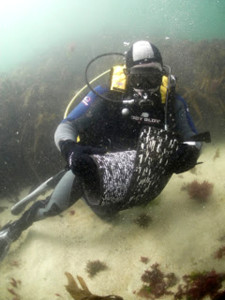 The following month we went to Castle Beach, in some rather inclement conditions. We had spoken with some locals who regularly cleaned the beaches; they did a surface pick while we went underwater.
The following month we went to Castle Beach, in some rather inclement conditions. We had spoken with some locals who regularly cleaned the beaches; they did a surface pick while we went underwater.
Pendennis headland was our next target, our best turn-out so far, with 15 divers collecting rubbish.
Over the past few months I had been in contact with Beach Care, part of Keep Britain Tidy – they organise beach litter picks around Devon and Cornwall. We had arranged a combined event with Tremough (Falmouth University), where there would be both surface and underwater litter collections. Nineteen divers in all went in, a split of half locals and half students.
Our last litter pick of 2012 was conducted back at Swanpool. There was litter there but not in the quantity we had found originally, we had made a difference.
During the start of 2013, the combined easterly winds and freezing conditions caused us to take a break from litter collection. By May the water temperature still hadn’t really increased but we decided to have a go. The plan for this year is to keep up with the monthly picks but also to try and get people to pick litter during social dives. The first social dive at Gyllyngvase proved mildly successful; it gives us a base to work on though.
Marine Life & Conservation
Leading UK-based shark conservation charity, the Shark Trust, is delighted to announce tour operator Diverse Travel as a Corporate Patron

 Corporate Patrons provide a valuable boost to the work of The Shark Trust. The Trust team works globally to safeguard the future of sharks, and their close cousins, the skates and rays, engaging with a global network of scientists, policymakers, conservation professionals, businesses and supporters to further shark conservation.
Corporate Patrons provide a valuable boost to the work of The Shark Trust. The Trust team works globally to safeguard the future of sharks, and their close cousins, the skates and rays, engaging with a global network of scientists, policymakers, conservation professionals, businesses and supporters to further shark conservation.
Specialist tour operator Diverse Travel has operated since 2014 and is committed to offering its guests high quality, sustainable scuba diving holidays worldwide. Working together with the Shark Trust will enable both organisations to widen engagement and encourage divers and snorkellers to actively get involved in shark conservation.
“Sharks are truly at the heart of every diver and at Diverse Travel, we absolutely share that passion. There is nothing like seeing a shark in the wild – it’s a moment that stays with you forever!” says Holly Bredin, Sales & Marketing Manager, Diverse Travel.
“We’re delighted to celebrate our 10th year of business by becoming a Corporate Patron of the Shark Trust. This is an exciting partnership for Diverse and our guests. We will be donating on behalf of every person who books a holiday with us to contribute towards their vital shark conservation initiatives around the world. We will also be working together with the Trust to inspire divers, snorkellers and other travellers to take an active role – at home and abroad – in citizen science projects and other activities.”
Paul Cox, CEO of The Shark Trust, said:
“It’s an exciting partnership and we’re thrilled to be working with Diverse Travel to enable more divers and travellers to get involved with sharks and shark conservation. Sharks face considerable conservation challenges but, through collaboration and collective action, we can secure a brighter future for sharks and their ocean home. This new partnership takes us one more valuable step towards that goal.”
For more information about the Shark Trust visit their website here.
For more about Diverse Travel click here.
Marine Life & Conservation
Shark Trust Asks Divers to help with Shark Sightings this Global Citizen Science Month

 Whether you are stuck for ideas of what to do with the kids or are off on the dive trip of your dreams. You can get involved in Citizen Science Month and help the Shark Trust by providing vital data about sharks are rays both close to home and further afield.
Whether you are stuck for ideas of what to do with the kids or are off on the dive trip of your dreams. You can get involved in Citizen Science Month and help the Shark Trust by providing vital data about sharks are rays both close to home and further afield.
In addition to reporting the sharks and rays you see on your dives, the eggcases you find on the beach, the Shark Trust is looking for some specific data from divers who are asked to report any Oceanic Whitetip and Basking Sharks.
Oceanic Whitetip Sharks
The Shark Trust are looking specifically for Oceanic Whitetip Shark sightings over the coming weeks and months. So, if you are diving anywhere in the world, please report your sightings via the website or app.
Website: https://recording.sharktrust.org/
App: Search The Shark Trust in your app store
The Oceanic Whitetip. Known for their incredibly long dorsal and pectoral fins, this species was once the most abundant oceanic-pelagic species of shark on the planet.
Large and stocky, they are grey or brown above, and white below and famous for their huge rounded first dorsal fin and paddle-like pectoral fins. The fins also highly prized within the shark fin trade. Whilst they are mostly solitary, Oceanic Whitetips do occasionally hunt in groups.
An inquisitive species, they were easy prey for fisheries. Combined with their low reproductive rate, they were inevitably at high risk of population depletion. And declines of up to 99% have been reported in certain sea areas. They are listed as Critically Endangered on the IUCN Redlist (2019).
Conservation efforts to discourage further declines include listing on CITES Appendix II and CMS Appendix I. They’re also the only species prohibited from take by all the Tuna RFMOs (Regional Fisheries Management Organisations). However, these measures do not mean that Oceanic Whitetips are not still caught – whether targeted or as bycatch – in some parts of the world. With populations declining at such a high rate, effective implementation of management measures is essential to ensure that the species can recover.
If you are lucky enough to get an image of an Oceanic Whitetip and you record your sighting on the Shark Trust app or website YOU CAN WIN! All images submitted with sightings, that also give consent to use in conservation messaging, will be in with a chance to win an Oceanic Whitetip T-shirt and mug. The competition will run until the end of “Shark Month” in July – so keep those sightings (and images) coming in.
Basking Sharks
Basking Shark (Cetorhinus maximus) season is upon us, and the Shark Trust is asking everyone to keep an eye out for these majestic giants over the summer months. If you see any, you can record your sighting to the Basking Shark Sightings database.
Each year, these mighty fish return to British waters to feed on plankton. You may see one, (or a few if you’re really lucky) from around April-October. They can be seen feeding at the surface of the water, where they look like they’re basking in the sun. Thus, their name!
Sighting hotspots around the British Isles include southwest England, Isle of Man, north coast of Ireland, and western Scotland. The Sea of the Hebrides is the most prolific sightings area in Scotland, but they have been spotted all around the coast and have even ventured into some of the sea lochs. The Shark Trust has received thousands of sightings since the Basking Shark project began, but more data is needed to truly understand what is going on with population numbers and distribution. You can help by recording your sightings this summer.
Great Eggcase Hunt
The Shark Trust has an Easter Egg Hunt with a difference for you to try. Take part in the Great Eggcase Hunt and get involved with a big citizen science project that helps shark, ray and skate conservation. And it’s an enjoyable activity for all the family.
The Shark Trust also want snorkellers and divers to record their underwater eggcase findings. Underwater records help pinpoint exactly where sharks and skates are laying their eggs and can help link to beach records. Learning the depth and substrate that they lay on also helps better understand the species.
Find out more: https://www.sharktrust.org/great-eggcase-hunt
Whether you are diving, snorkelling or exploring on the beach you can take part in Citizen Science Month and get actively involved in shark and ray conservation. Find out more: www.sharktrust.org
-

 News3 months ago
News3 months agoHone your underwater photography skills with Alphamarine Photography at Red Sea Diving Safari in March
-

 News2 months ago
News2 months agoCapturing Critters in Lembeh Underwater Photography Workshop 2024: Event Roundup
-

 Marine Life & Conservation Blogs2 months ago
Marine Life & Conservation Blogs2 months agoCreature Feature: Swell Sharks
-

 Blogs1 month ago
Blogs1 month agoMurex Resorts: Passport to Paradise!
-

 Blogs2 months ago
Blogs2 months agoDiver Discovering Whale Skeletons Beneath Ice Judged World’s Best Underwater Photograph
-

 Gear News3 months ago
Gear News3 months agoBare X-Mission Drysuit: Ideal for Both Technical and Recreational Divers
-

 Gear Reviews2 months ago
Gear Reviews2 months agoGear Review: Oceanic+ Dive Housing for iPhone
-

 Marine Life & Conservation2 months ago
Marine Life & Conservation2 months agoSave the Manatee Club launches brand new webcams at Silver Springs State Park, Florida









